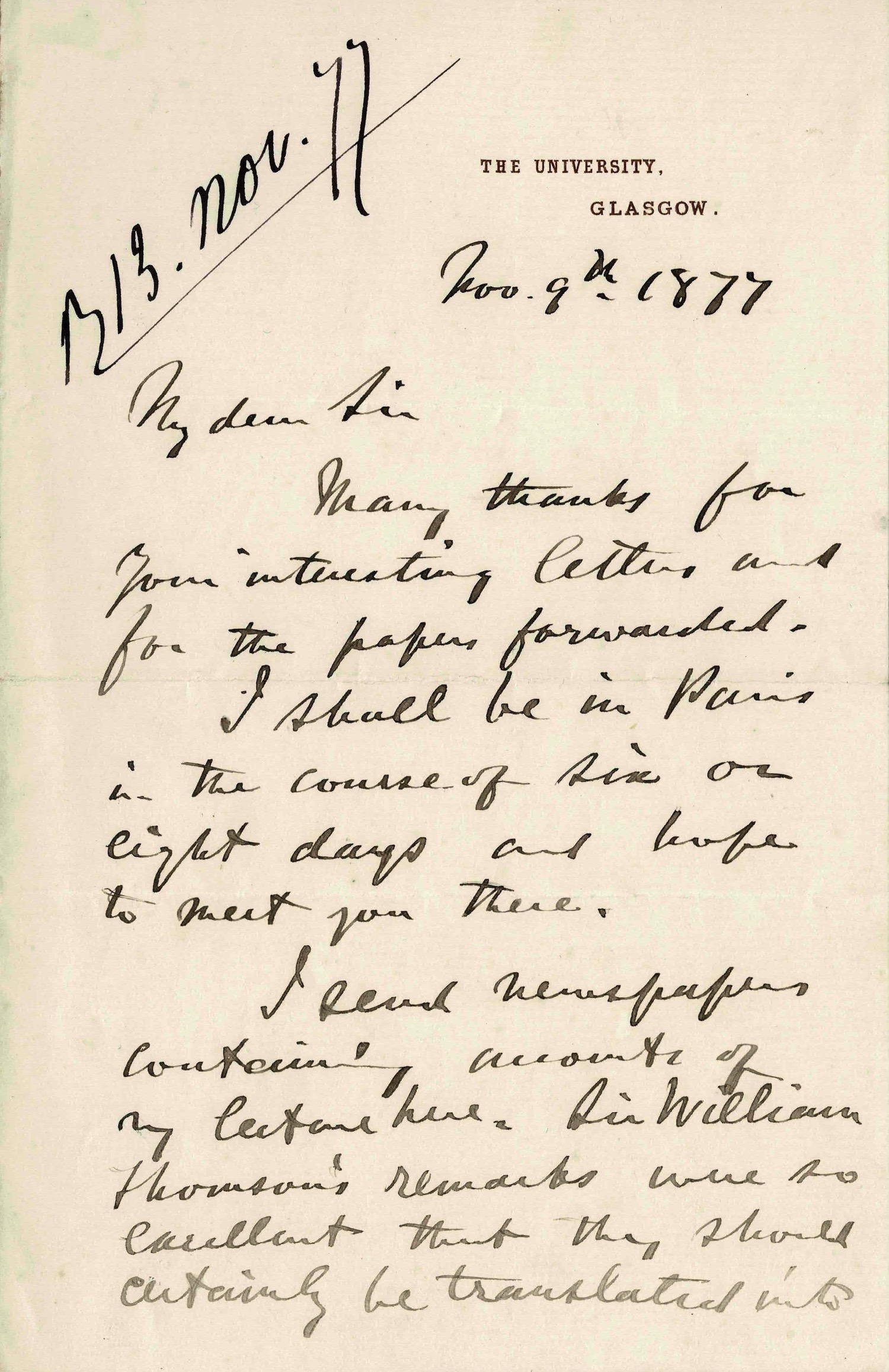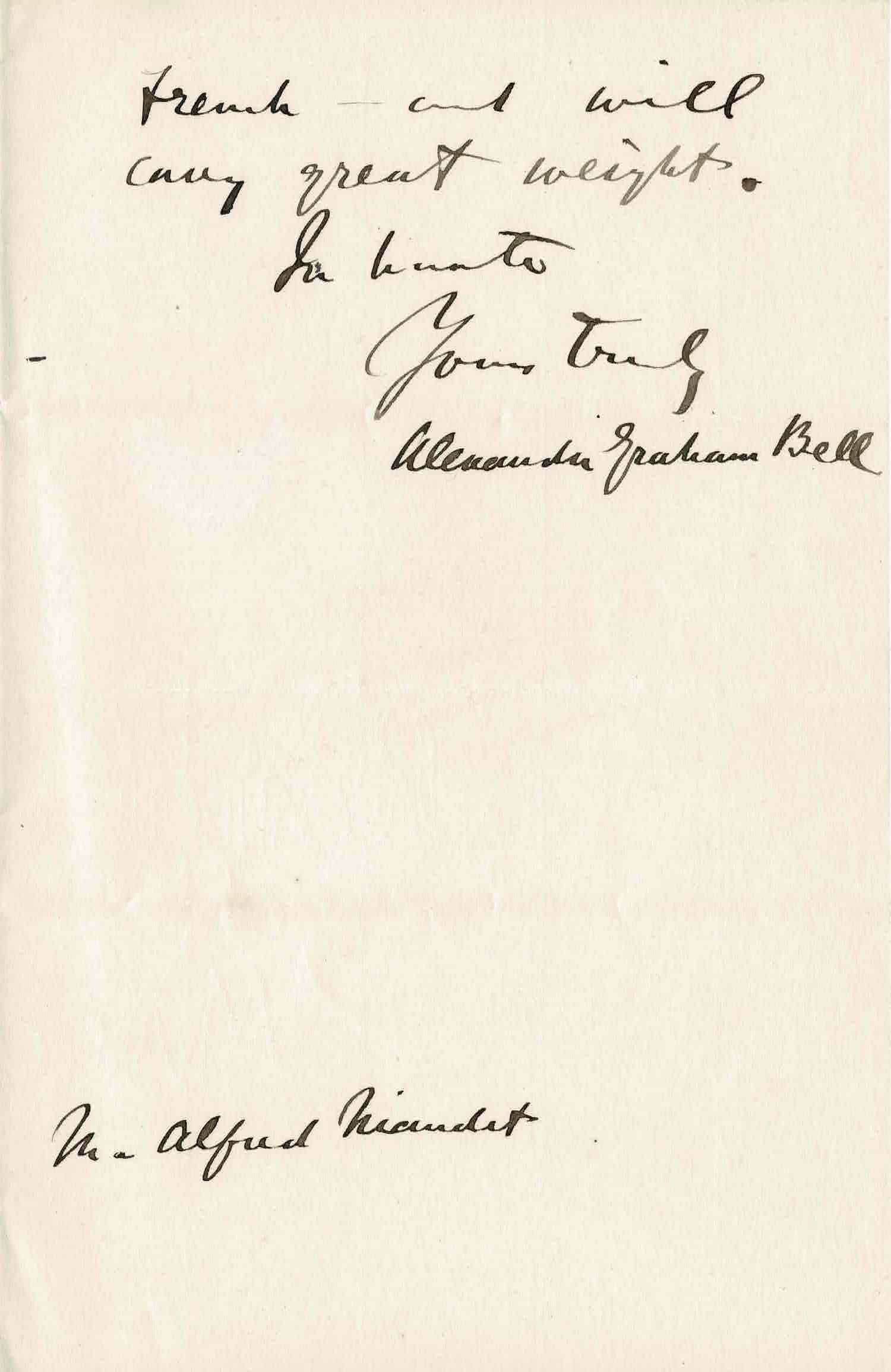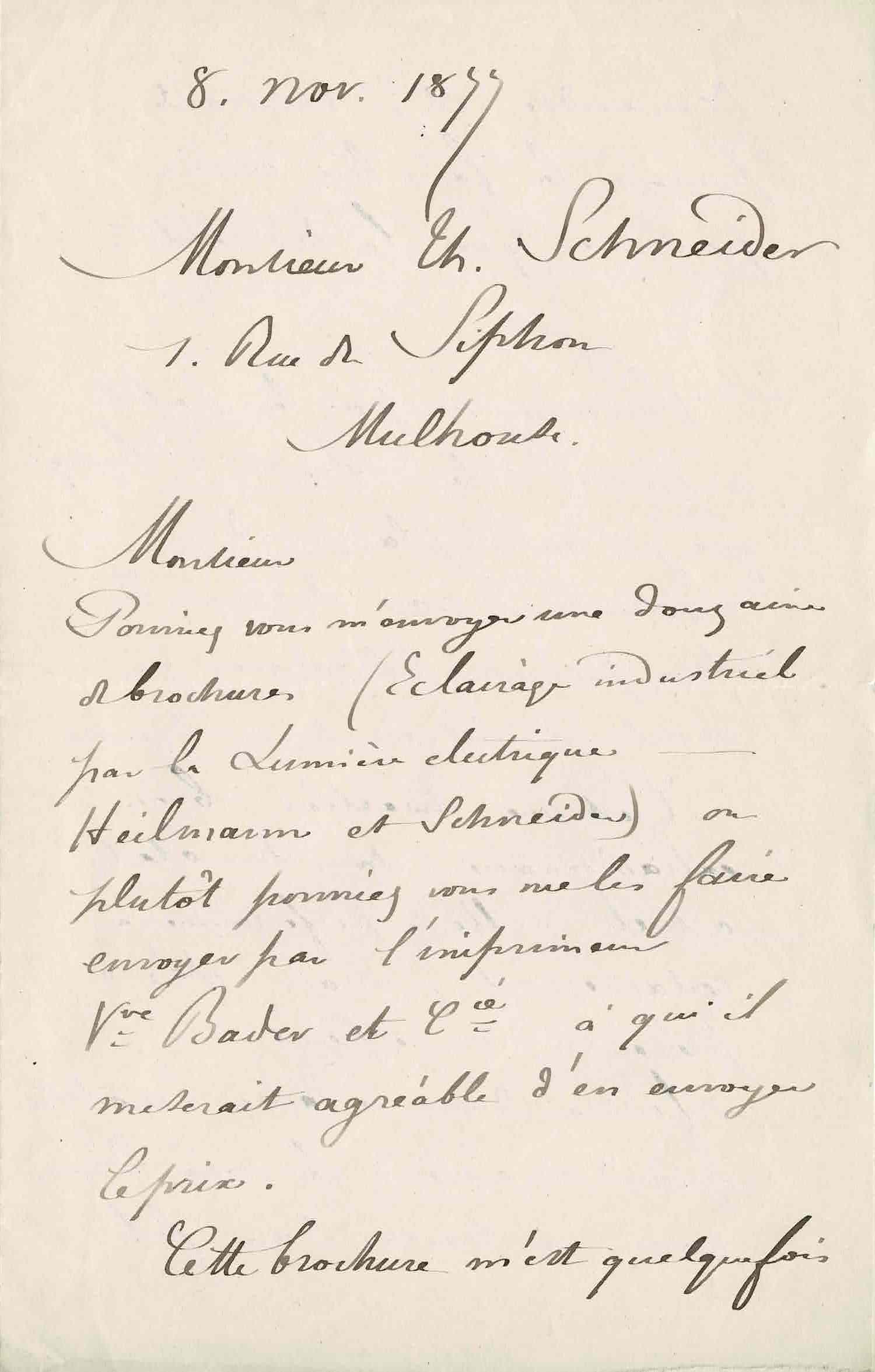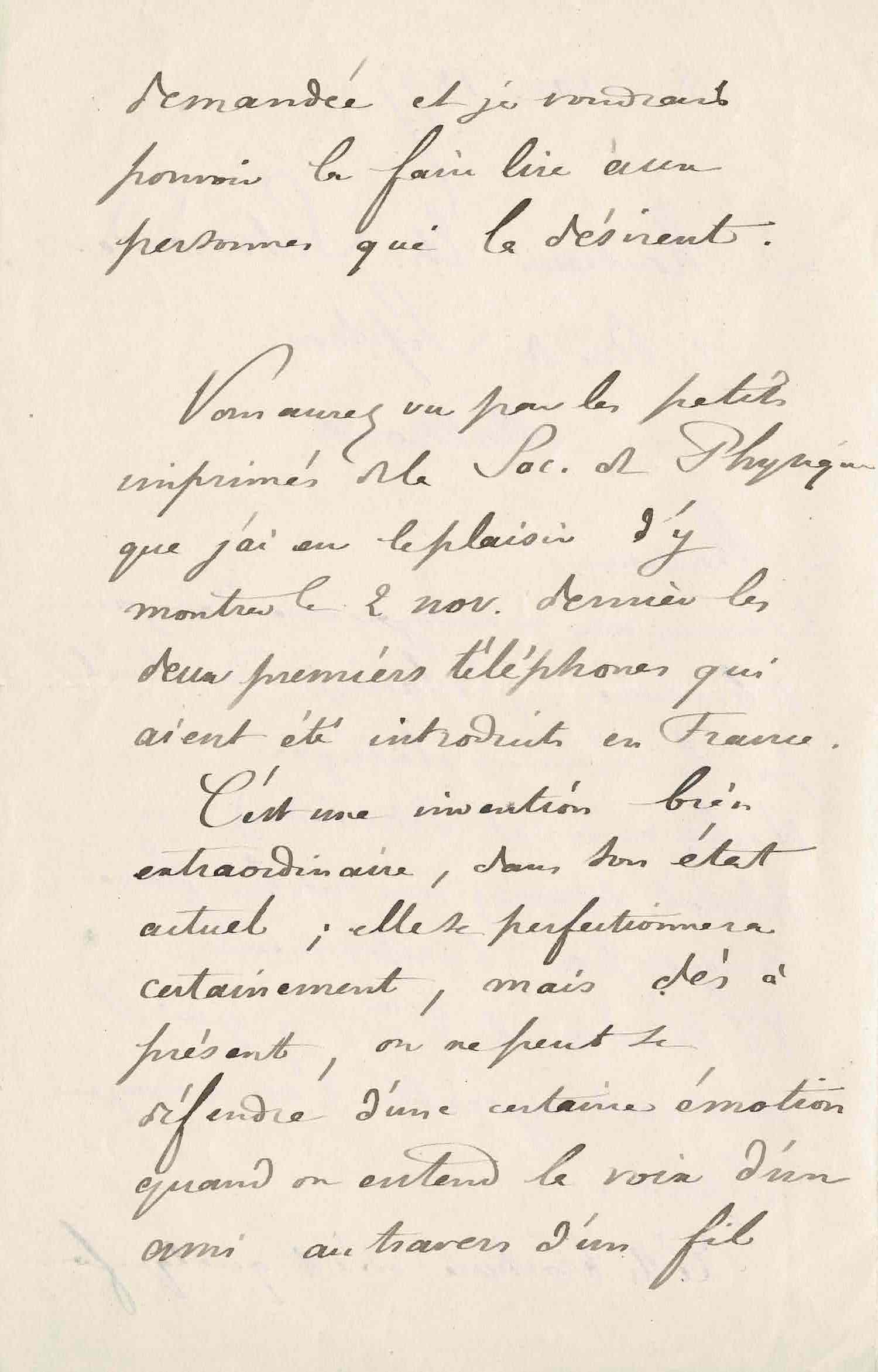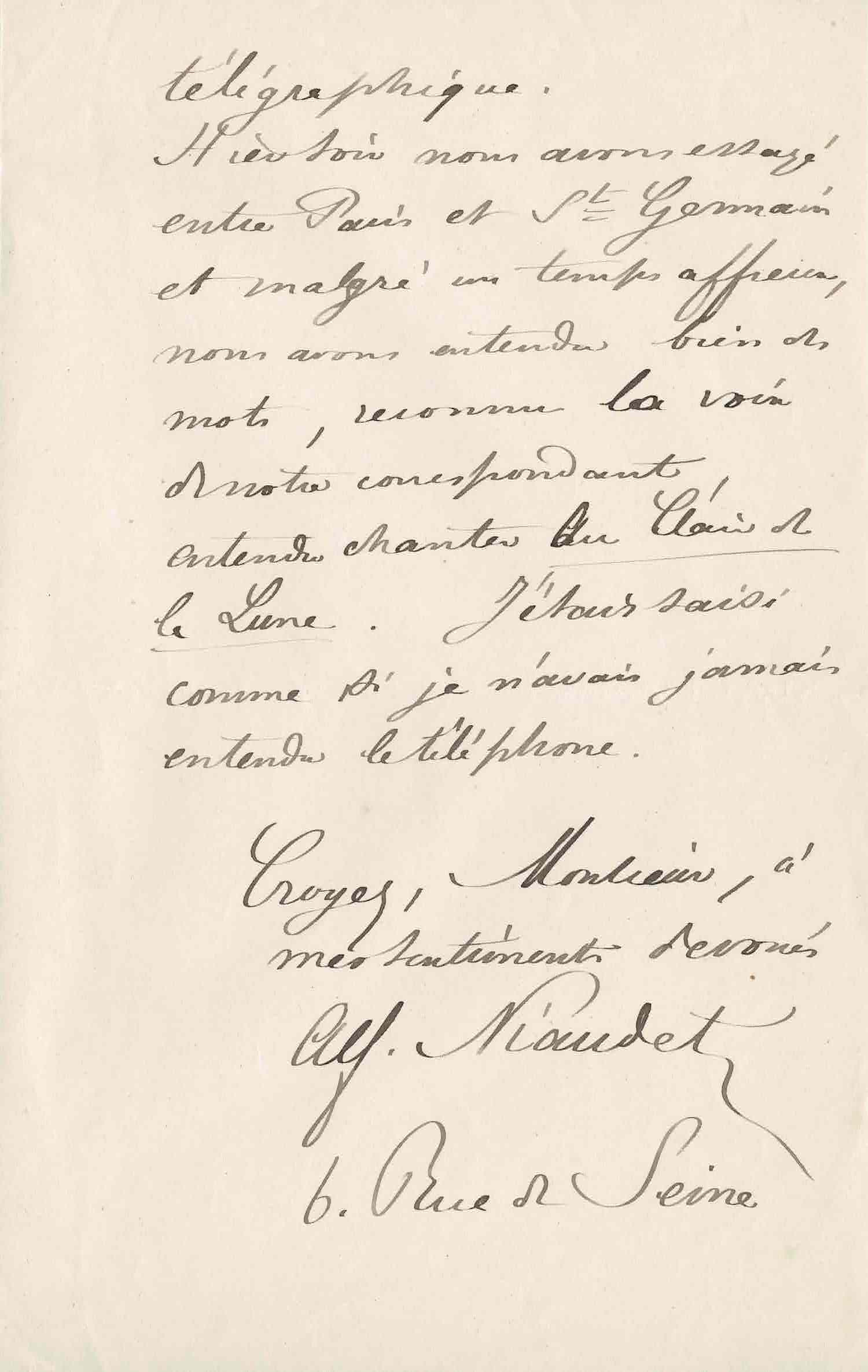Alexander Graham BELL / Alfred NIAUDET
The invention of the telephone and its first demonstration in France in 1877.
“You will have seen from the small prints of the Soc. of Physics that I had the pleasure of showing there on November 2, the first two telephones that were introduced in France. »
One of the most prodigious inventions in human history told by two of its essential actors: Alfred Niaudet and Alexander Graham Bell.
__________________________________________________________________
Extraordinary meeting of two signed autograph letters relating to the revolutionary work of Alexander Graham Bell and the first use of the telephone in France, in Paris, in November 1877.
In August 1877, at the request of the famous British scientist Sir William Thomson, Alexander Graham Bell was invited to present his invention at the annual meeting of the British Association for the Advancement of Sciences in Plymouth. Among the audience, the physicist Alfred Niaudet, collaborator of Antoine Breguet, was captivated by Bell's invention and easily convinced the latter to entrust him with two telephones to demonstrate in Paris, at the Academy of Sciences and at the French Physical Society.
A year earlier, during the Centennial Exhibition of the Independence of the United States, in Philadelphia, in June 1876, Alexander Graham Bell unveiled his invention under the amazed eyes of the Emperor of Brazil Dom Pedro II and Sir William Thomson. The revolution was launched and the inventor overwhelmed by requests for conferences.
We present here two letters, testimonies of this exceptional adventure.
The first written by Alfred Niaudet, on November 8, 1877, a few days after the first demonstration of a telephone in France; the second written by Alexander Graham Bell the next day, November 9, to Alfred Niaudet.
We also attach the original brochure (10 pages in-8°) published by the Society of Civil Engineers, giving an extract from the Session of December 2, 1877, and Alfred Niaudet's communication on telephones.
__________________________________________________________________
Alfred NIAUDET (1835- 1883)
Autograph letter signed to the physicist Théodore Schneider.
Three pages in-8°. [Paris] November 8, 1877.
“It’s a very extraordinary invention. »
“Sir, Could you send me a dozen brochures (industrial lighting by electric light – Heilmann and Schneider) or rather could you have them sent to me by the printer Vve Bader et Cie to whom it would be pleasant for me to send the price. This brochure is sometimes requested from me and I would like to be able to have it read by people who want it.
You will have seen it from the small prints of the Soc. of Physics that I had the pleasure of showing there on November 2, the first two telephones that were introduced in France.
It is a very extraordinary invention, in its current state; it will certainly improve, but from now on, we cannot help ourselves from a certain emotion when we hear the voice of a friend through a telegraph wire.
Yesterday evening, we tried between Paris and St Germain and despite the terrible weather, we heard many words, recognized the voice of our correspondent, heard singing Au Clair de la Lune . I was struck as if I had never heard the telephone. Believe, Sir, in my devoted feelings. Alf. Niaudet. 6 rue de Seine. »
__________________________________________________________________
Alexander GRAHAM BELL (1847- 1922)
Autograph letter signed to Alfred Niaudet.
Two pages in-12° on University of Glasgow letterhead.
[Glasgow] November 9, 1877.
Annotation by Niaudet at the top indicating having responded on November 13, 1877.
“Sir William Thomson's remarks were so excellent that they […] will carry great weight.”
“My dear Sir, many thanks for your interesting letter, and for the papers forwarded. I shall be in Paris in the course of six or eight days and hope to meet you there. I send newspaper containing accounts of my reading here. Sir William Thomson's remarks were so excellent that they should certainly be translated into French– and will carry great weight. In haste. Yours truly. Alexander Graham Bell. »
French transcription:
“Dear Sir, thank you very much for your interesting letter and for the newspapers you sent me. I will be in Paris for six or eight days and I hope to meet you there. I am sending you a journal containing the proceedings of my conference here. Sir William Thomson's remarks were so brilliant that they should certainly be translated into French – and will carry great weight. In haste, yours, sincerely. Alexander Graham Bell. »
__________________________________________________________________
Although the collective unconscious today only remembers the name of Alexander Graham Bell as the inventor of the telephone, this societal revolution was a human adventure with several factors and the real authorship of the invention gives rise, even today Today there are many controversies.
The Frenchman Charles Bourseul (1829.1912) seems to have been the first – in an article entitled Electric transmission of speech, published in L'Illustration on August 26, 1854 – to propose a mechanism capable of transmitting the voice at a distance via an electric wire.
The German scientist Johann Philipp Reis (1835.1874) developed, in 1860, a device that he called a “telephone” and which made it possible – although very imperfectly – to transmit sounds and voices at a distance, using an electric current.
It was the Italian-American Antoni Meucci (1808.1889) who was the first to file a patent describing a telephone device in December 1870. Not having the financial means to extend the said patent, Meucci let it expire in 1874 and a certain Alexander Graham Bell filed it in turn, improved, in 1876.
Meucci's major influence in the history of the telephone was officially validated by the United States House of Representatives on June 11, 2002, which recognized in its resolution no. 269 that " if Meucci had been able to pay the $10 fee to maintain his patent promise after 1874, no patent could have been issued to Bell ” and thus making Meucci an official inventor of the telephone.
Another actor in this epic, the inventor Elisha Gray (1835.1901) filed a patent application with the American Institute of Industrial Property for an invention concerning “ the electrical transmission and reception of the human voice ”, on February 14, 1876. , just a few hours after Graham Bell. Bell's patent was reportedly examined immediately at the request of his lawyer, while Gray's was not examined until the next day. Despite numerous lawsuits filed, Gray was unable to have the antecedence of his work recognized.
Finally, it was David Hugues and Thomas Edison who proposed, from 1877, the most significant developments in microphones (Edison had developed, in 1877, the first device capable of recording and reproducing sounds: the phonograph ).
“Mister Watson, come here, I want to see you!”
“Mr. Watson, come, I want to see you!” » : here is what history remembers as being the first words exchanged, from one room to another, by Bell with his assistant Thomas Watson (1854.1934). The voice emerging from a coil connected by two conductive wires launches the course of an extraordinary scientific revolution, still underway nearly one hundred and fifty years later.
__________________________________________________________________
Bibliography: Alexander Graham Bell. Jean-Serge Bernault.

